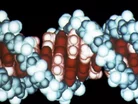Gene flaw found in MS treatments

Scientists from Oxford University have finally discovered why a particular class of drugs which were manufactured to help treat MS sufferers never made the intended impact, and why, in some cases, they exacerbated the illness.
The University team has identified a genetic variant linked to multiple sclerosis which does not work in the same way for that particular illness as it does with other autoimmune diseases, and can even make the condition worse. It is now thought that the success of the drugs was largely down to each individual’s genetic make-up, making them unsuitable for vast portions of the population.
To read the latest edition of Healthcare Global, click here
- Livestock responsible for majority of world diseases
- Emergency caesarean simulator to help junior doctors
- Autism diagnoses could be possible
The anti-tumour necrosis factor (anti-TNFs) drugs worked in regards to rheumatoid arthritis and inflammatory bowel disease, but scientists have now confirmed that the same influences are not had on MS.
A particular genetic variant called TNFRSF1A was found to shorten the TNFR1 protein encoded by the gene. This meant that it was unable to sit on the surface of the cells to bind TNF, leading to a blockage on the required signals being sparked, and blocking the influence of the gene.
Nick Rijke, Director of Policy and research at the MS Society explained the significance of these findings in specifying future treatments to people’s specific genetic requirements.
He stated: "There are many genes associated with MS, but we know little about the role they play or the influence they have on the condition.
"This important study has shown that some of your genes can play a part in deciding whether or not you respond to a treatment.
"In the future this could help ensure that people with MS are offered the drug treatments that are most likely to work for them."
